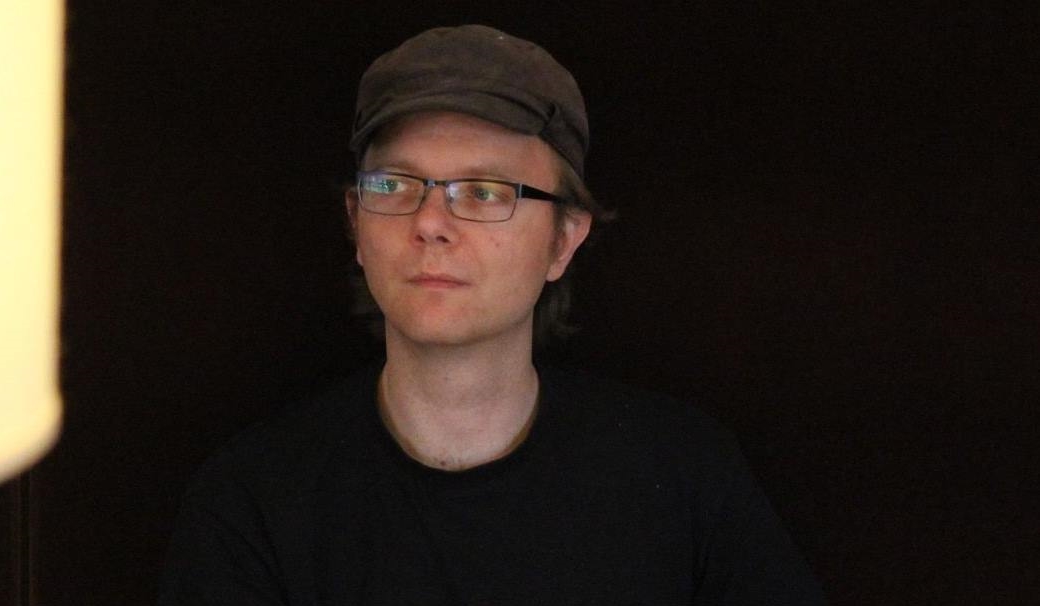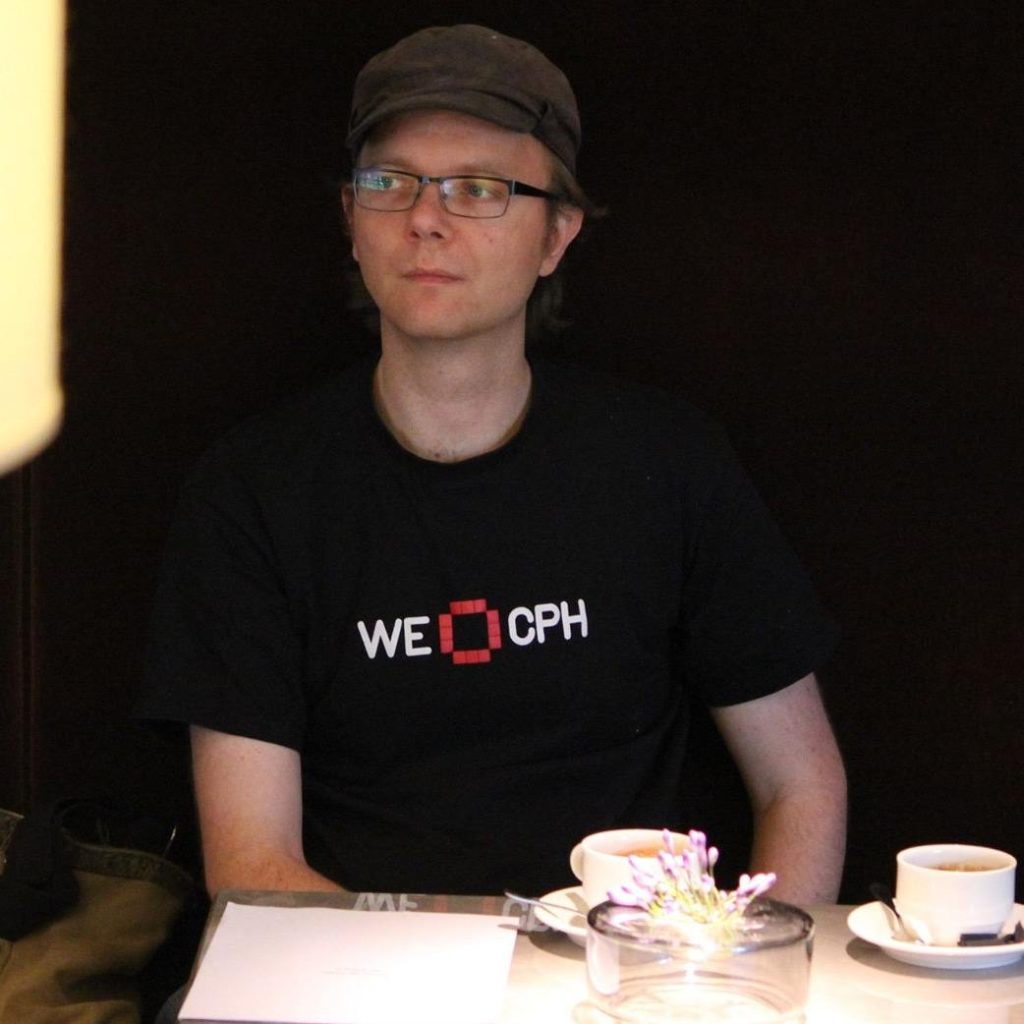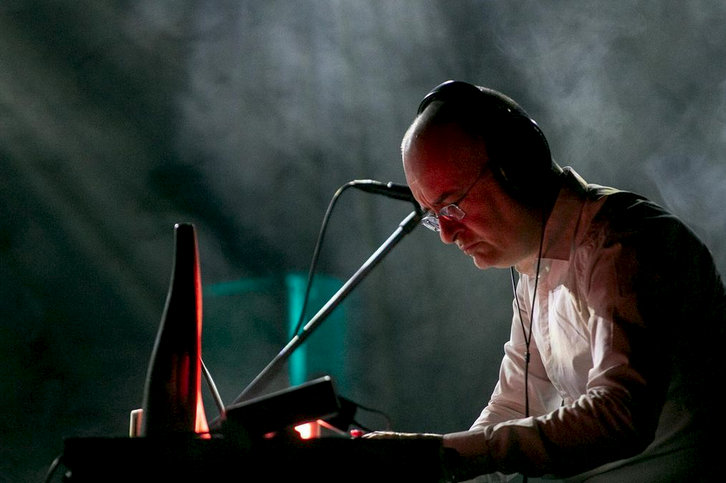Today’s interview guest is Tobias Fischer, a journalist, copywriter, author, and radio host based in Berlin, Germany. He is one of the most respected journalists in the field of music. From Jean Michel Jarre, Nils Frahm, or A Winged Victory for the Sullen, all spoke to Tobias. The journalist amassed over 3000 interviews over his career and he never ceases to amaze us.
According to the 15 Questions‘ About section, Tobias is “the founder and former editor-in-chief of leading new music site tokafi.com and a cultural editor for Germany’s biggest Printmag on Recording, „Beat“. He regularly writes for arts magazine “White Fungus” and has contributed liner notes to a wide range of releases, from contemporary composer Steve Reich to ambient master vidnaObmana. He is also a contributor to one of Germany’s leading food websites “Gekonnt Gekocht.” Tobias originally developed the 15 Questions interview for tokafi.com, featuring close to 400 artists as part of the series between 2005 and 2012 and continually adjusting the questionnaire. For 15questions.net, he has now expanded the concept to include journalists, PR managers and sound engineers.“
We caught up with Tobias to share his journey, the experience of being a music journalist, and some insights on today’s music.
Hello, Tobias! It’s nice to have you!
Hi, hope you’re doing well!
Many people have a moment, a band, or a song that kick-starts their interest in music seriously. Can you put your finger on something similar?
Dutch television once aired a special on electronic music. It featured Jean-Michel Jarre, and Vangelis, among others. This must have been over thirty years ago. To this day, I remember seeing Jarre live-performing “Oxygene” and studio footage of Vangelis performing “The Dragon” on synths and various percussion instruments. Not long after, I bought “Oxygene” on CD and discovered an entirely new world.
How would you briefly describe your everyday activities to someone that doesn’t know much about you?
It’s a long stream of writing and editing. More of the latter than the former at the moment, although I’m very determined to change that very soon.
There are many different projects, some of which bear no relationship with each other whatsoever, some of which interlock in constantly different ways.
Besides my work as an (SEO) copywriter, I write for Germany’s biggest printmag on recording, “Beat”, for whom I also conduct a series of podcast interviews (behind the beat), collaborate with art magazine “White Fungus” whenever they are ready for a new issue, and write press releases for a few labels and artists.
And then, of course, there’s the constant search for new interviewees for “15 Questions” as well as the editing of the interviews which have come in. As well as keeping the questions up-to-date and interesting.
What do you want your readers to get out of reading your interviews?
That’s a great question because it’s something I think about a lot. The main idea is always to learn something about music – how people involved with it experience it, think about it, and approach it in their work.
It’s supposed to be a personal perspective and knowing the artist in question will most likely increase your enjoyment of reading their thoughts. But I always liked the idea that you could get something out of the exchange even if you’d never heard the music.
And, of course, reading about it is a different way to discover exciting new music than through a playlist. I still think it can be very powerful if done right.
What music, scene, or process catches your attention the most out of all the things you cover in your magazine?
It’s remarkable how fascinating the interviews about fashion turn out to be. Fashion is probably the last topic that drew me to music and I’ve never spent much time researching it, either. Just out of curiosity, I started a series of interviews on it, partly simply to educate myself.
These interviews are now probably my favorite ones on the site. Artists love doing them, they make for a great read and I learn a lot from them. And they actually turned me onto fashion and how important it is once you take things to a deeper level.
It’s something you cover really well on CVLTARTES, by the way, especially in conjunction with great photography.
Thank you! There are a lot of great music blogs, many of which are not written by professional writers, yet some still exceed the quality of published magazines. Why is it essential for professional music journalism to still exist?
I should preface my thoughts on this by stating that one of the reasons I wanted to become an arts journalist was because of the (to me) appalling work many supposedly “professional” colleagues were doing.
I think there is a role to play for writers who are dedicated to a topic beyond the mere pleasure aspect. To me, a music journalist will dive into topics out of curiosity that may not even be connected to the music. They may talk to musicians they would otherwise never even be interested in, for example, or research subjects that were outside of their scope. Committing to this can either yield lackluster results – or reveal something from an entirely different and fresh perspective.
It’s one of the reasons I really love working with my friends at “White Fungus“, an arts magazine originally from New Zealand. We’ve worked together for almost a decade now and usually, ideas for an article come from them, not myself. It pushes me into areas that are clearly close to me, but still challenging.
I also believe that researching is an art and that this is something you learn through many years of experience. How relevant this will still be in the age of AI remains to be seen, of course.
How do you see the role of music magazines in ‘building’ an artist today?
I would say it’s pretty much the same as it’s always been: Music journalism should be about highlighting artists whose work warrants inspection, whose thoughts warrant inspection; about evaluating and interpreting the music, offering new ways of listening to it, providing details on how it was made and what to listen for.
The issue that most magazines face – in as far as there still are more than just a handful of meaningful music magazines anymore – is how to get people to read about someone they’ve never even heard about. This was hard enough during the print age but it’s become even harder in digital: How to convince someone to click on a piece featuring an as-yet-unknown musician?
For most publications, the approach has been to use size as a wrench – if you have enough visitors, a few will read your new artist recommendations as well. Clearly, this is not a very elegant solution.
Finding an answer to this question is vitally important because as long as we don’t, “building” artists will always remain entirely in the hands of the big media companies – i.e. attention will follow the money. “15 Questions” is an attempt at going a different route: Inviting readers to check out an artist because they know they’ll enjoy the questionnaire format – and then checking out the music through the back door.
As a music journalist, do you know whether there’s something different about the nature of contemporary music fans’ relationship with music in the streaming era?
Playlists as albums
albums as projects
listening on the go
loss of ownership
Music is well known to be a therapeutic tool for individuals suffering from depression, anxiety, and other conditions. But if used to more extensive content, can music be an agent for change in society?
Most listeners both overestimate and underestimate the impact music has and can have on their lives. Everything depends on how we listen and what we listen for. Tori Amos once said, and I’m paraphrasing from memory here, that for most, putting on a song, is about numbing something. Especially when we have music on all the time, there is bound to be a sense of blunting.
That said, the more we invest in the listening experience, the more we open our ears up and allow for discovery, surprise, and even confrontation, and the more we’ll get out of it.
But here’s an important point: If we believe, as I do, that music can indeed be a tool for healing, then we must acknowledge that it can hurt us, too. There is no such thing as homeopathy in art (or outside of it, but that’s another matter).
How do you think the availability of AI music shapes modern human beings?
My friend Markus Reuter makes some incredible music under the moniker of Kid Arrow which he creates in collaboration with a self-written algorithm. https://kidarrow.bandcamp.com/
It’s not strictly speaking AI music, the music is still strongly based on his taste and preferences, and obviously, the algorithm is his. But it does make use of generative processes which allow him to create huge amounts of large-scale works in a very short time span.
This music is mind-expanding and fascinating and would probably be impossible to make outside of this particular process. Clearly, in the right hands, there is enormous potential here for pushing the borders of music, especially in light of the healing aspect you addressed in the previous question.
Do I believe that, nonetheless, the main force will be a brutal push for commercial abuse which replaces human creative input with machinal for as much as possible? Absolutely.
How will this shape humans? That is a fascinating question, which I should probably integrate into 15 Questions in some form.
I would say that music is one tool among many to satisfy our needs and wants and as AI becomes more advanced, accessible, and affordable, it will become easier to manufacture music that fulfills these needs and wants more specifically, effectively, and reliably than ever before. It depends on future generations on whether that is a positive or negative development.
How important is the visual side of an artist, in your opinion?
After conducting the fashion interviews I mentioned before, I would put it this way: It’s one more potential layer of identification with an artist – for many, it may even be the most important one.
What would you like to see more of in music journalism right now? Or less?
This may sound like a bizarre statement coming from someone who has edited in the proximity of 3,000 interviews – but I really wish that the article, rather than the interview reclaimed its position as the leading discipline in journalism. I would really like to get more high-quality reflections on the work of an artist rather than artists reflecting on it. I think the outside perspective is quite often more interesting and, surprisingly, more accurate than the inside one.
I would like to see more space dedicated to medium-length pieces. It doesn’t all have to be either snippets or long-form. In my opinion, the “building” of artists you asked me about a few questions earlier takes place in this mid-length area.
Finally, I think we need to have a bit more freedom for criticism again. When I started, it was my mission never to award a rating to music. In fact, it was part of the concept behind my first own magazine, “tokafi“, to never ever mention my own opinion of work in a review (which were called “album features” instead for that very reason). Today, I feel like criticism has its place if done well. Not everything is equal and even if a rating is subjective, there is real value in subjectivity.
This is an ongoing theme for Markus and me in our Mike Oldfield podcast, by the way.
If you had to point folks to one interview of yours, what would it be and why?
Choosing between literally thousands of interviews is next to impossible, although I do have my favorites.
With that in mind, I’d pick my fairly recent conversation with Jean-Michel Jarre. He was the artist who made me a listener and whose work changed my life, quite literally. The interview was amazing on so many levels, from the personal to the insights I gained. My brother Dirk, who recorded the interview for the German magazine “Beat”, was taken as much by it as I was.
It’s available online on 15 Questions, spread out across three different pieces.
I’m curious to hear what music you are listening to, as there is an incredible range of amazing artists on Fifteen Questions. Can the best stories only come from writing about genres you love?
Right now, I’m revisiting the work of Mike Oldfield a lot for the aforementioned Mike Oldfield podcast Markus and I just started.
In terms of some of the other music that I really enjoy listening to, here are a few selections:
- Noemi Büchi: “Material” (epic symphonic music expressed through meticulous sound art)
- Photek: “Solaris” (The first 2/3 are an atmospheric juxtaposition of deep house and drum n bass, the final 1/3 a dark, psychedelic descent into mind-melting cinematics)
- Nils Petter Molvaer & Moritz von Oswald: 1/1 (A large-scale immersion into a sacral ambiance on the wings of dub, ambient, and jazz)
- Protection: “Seeds II” (Incredibly fresh take on breakbeats, emphatic songs without words)
- Ariana Delawari: “I Will Remember”
- Gabriela Martina: “Homage to Grämlis” (A concept album into the mind of an artist for whom Swiss yodeling and alphorns occupy the same space as jazz and post-rock)
- Audrey Carmes: “Quelque chose s’est dissipé” (This came completely out of the blue – an intimate and poetic vision of organic electronic composition)
- Georgia: “Euphoric” (Not as club-oriented as her previous album, it has a beautifully subdued emotional power as well as a refreshingly non-nostalgic synth-pop sound)
- Wareika: “Tizinabi LP” (the E2-E4 model interpreted from a 21st-century angle and a hint of bossa nova)
- Rodriguez Jr.: “Feathers & Bones” (Sensual, living, and breathing electronic music in between the couch and the club by an artist with an ear for space)
- Bedless Bones: “Sublime Malaise” (Dark, gothic songs created with a minimal set-up that twist and turn in myriads of ways you wouldn’t expect)
- Goldie: Timeless & Timeless Remixes (The original is still so different, and mesmerizing, (..) that even the best of the new and classic remixes pale against it)
- Domi & JD Beck: “Not tight”(Super smooth fusion jazz recorded so dry that it can’t help but wet my appetite)
Wow! Thank you for your music recommendations and for the interview.
Thank you!
You can follow Tobias’s work on :
15 Questions | White Fungus
Nicoleta Raicu
Latest posts by Nicoleta Raicu (see all)
- POST DEATH SOUNDTRACK’s Album Is a Tasty Treat For Your Ears - April 27, 2024
- Is ‘God Damn’ LOVE GHOST’s Best Single Yet? - April 27, 2024
- Dissecting IRONIC SWEDEN’s EDM/Future Pop Track, ‘Media Whore’ - April 26, 2024




